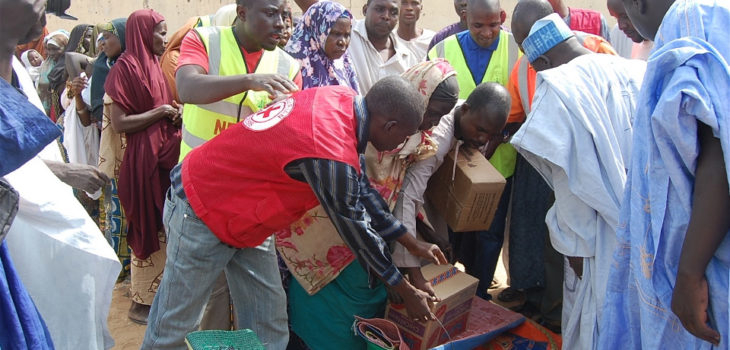 NCICC Blog
NCICC Blog
Nigeria And The Fight Against Impunity
Originally Published on Wednesday, 23 July 2014
NIGERIA AND THE FIGHT AGAINST IMPUNITY: A PROMISE NOT FULFILLED?
A Research Report By Benson Chinedu Olugbuo
Presented to:
Lot 87, Sacré Coeur 3, Pyrotechnie x VDN
BP 45435, Dakar-Fann, Sénégal Tel: 221-33-869-4686
Fax: 221-33-824-1567
E-mail: info@trustafrica.org
Website: http://www.trustafrica.org
1 April 2013
Executive summary
The current Nigerian government under the administration of Goodluck Ebele Jonathan has shown interest in the rule of law and the administration of international justice. This is in relation to the passage of the Anti-Terrorism Act of 2011 aimed at holding accountable those who commit terrorism related activities in Nigeria. Furthermore, the government has submitted a comprehensive international crimes Bill to the National Assembly to implement the Rome Statute of the International Criminal Court into domestic law. Despite some of the issues raised on provisions of the Bill discussed in this study, it is submitted that the Bill is a better version compared to the previous attempts by the Nigerian government to domesticate the Rome Statute. However, the introduction of the Bill into the National Assembly has not been followed up by commitment to ensure that the Bill is passed into law. Furthermore, there is currently lack of political will in Nigeria to investigate and prosecute international crimes especially, the crimes committed during the presidential elections in 2011 and recent Boko Haram attacks against innocent Nigerian civilians. This is because some government officials and politicians are complicit in the commission of these crimes. Furthermore, there are no adequate laws in Nigeria that will aid the effective prosecution of international crimes using the principle of complementarity.
The report finds that Nigeria has a robust civil society movement involved in activities aimed at ending impunity for international crimes at national and regional levels. However, there is currently lack of coordination in activities aimed at supporting international justice. This is because the Nigerian Coalition for the International Criminal Court currently lacks the funds and technical manpower to address the changing landscape of international justice in Nigeria. It may be necessary to support the coalition to ensure effective coordination of efforts by civil society organisations in Nigeria in the fight against impunity. The report further finds that some civil society organisations have mainstreamed gender justice into international justice activities and there is significant improvement in women involvement in advocacy and capacity building. However, this finding is related mostly to urban based organisations and excludes several community based advocacy groups. The study finds that there is minimal visible impact of international criminal justice proceedings and civil society advocacy activities on domestic politics, peace processes, security concerns and national reconciliation in Nigeria. This is because the call for the prosecution of those responsible for electoral violence in 2011 has not been matched by any visible change in the volatile nature of Nigerian politics as the 2015 general elections approaches. The report finds that Nigeria has the human, political, financial and judicial capacity to cooperate with the International Criminal Court in the fight against impunity under the complementarity principle. However, this is currently not feasible because of lack of a legal framework. The current Bill in the National Assembly contains several provisions in relation to cooperation with the Court. However, the report argues for the accession of the Agreement on Privileges and Immunities of the International Criminal Court and the implementation of the substantive provisions through the Bill in the National Assembly to ensure cooperation with the Court.
Table of contents
1.2 Background to the study……………………………………………………………………………………7
1.5.1 Application of positive complementarity in Nigeria
1.5.2 Domestic implementation of the Rome Statute in Nigeria
1.5.3 Insight and analysis on the ICC Bill
1.6 Identification of main organisations working on international justice
1.6.1 Efforts to advance ICJ in Nigeria
1.6.2 Transitional justice and conflicts in Nigeria
1.7 Conclusion and recommendations
1.7.2 The Ministry of Foreign Affairs
1.7.4 The National Human Rights Commission
1.7.5 The Nigerian Police Force
1.7.6 The Nigerian Armed Forces
1.7.7 Non-Governmental Organisations and Civil Society Organisations
List of abbreviations
APIC – Agreement on Privileges and Immunities of the Court
BIA – Bilateral Immunity Agreement
CD – Campaign for Democracy
CDD – Centre for Democracy and Development
CDHR – Campaign for the Defense of Human Rights
CICC – Coalition for the International Criminal Court
CLO – Civil Liberties Organisation
CRP -Constitutional Rights Project
CSO – Civil Society Organisation
FEC – Federal Executive Council
ICC – International Criminal Court
ICJ – International Criminal Justice
ICTR – International Criminal Tribunal for Rwanda
ICTY – International Criminal Tribunal for the former Yugoslavia
MASSOB – Movement for the Actualization of the Sovereign State of Biafra
MEND- Movement for the Emancipation of Niger-Delta
MFA – Ministry of Foreign Affairs
MOSOP- Movement for the Survival of Ogoni People
MRA – Media Rights Agenda
MOJ – Ministry of Justice
NAF – Nigerian Armed Forces
NCICC – Nigerian Coalition for the International Criminal Court
NHRC – National Human Rights Commission
NGO – Non-Governmental Organisation
NPF – Nigerian Police Force
OPC – Odua Peoples’ Congress
SAN – Senior Advocate of Nigeria
SCSL – Special Court for Sierra Leone
SVTF – Special Victims’ Trust Fund
“Nigeria takes her obligations towards realizing the ideals of the Rome Statute of ICC very seriously. We have ratified the Rome Statute as far back as 2001. Majority of the crimes created in the Statute are reflected in Nigerian national legislations. Notwithstanding, the procedure for consolidating these crimes into one composite legislation is ongoing.”[1]